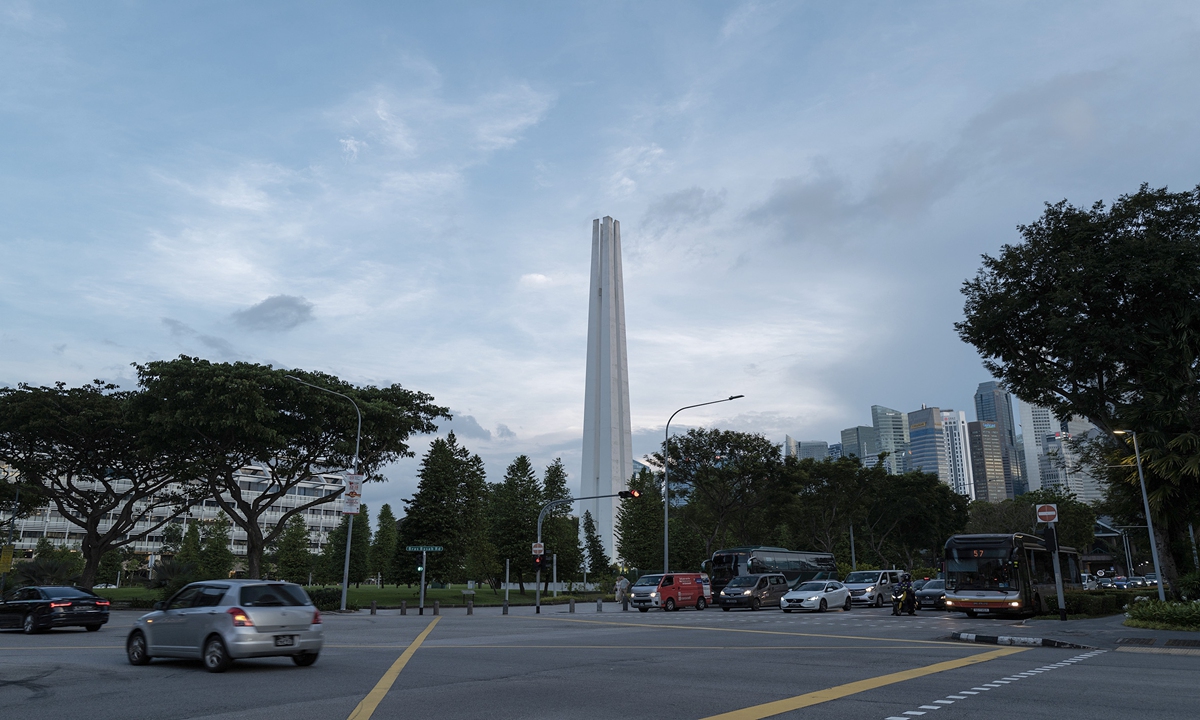By Peter T C Chang

The Memorial to the Civilian Victims of the Japanese Occupation in Singapore Photo: VCG
This September, Beijing's Tiananmen Square will host a military parade to commemorate the anniversary of China's victory over Japanese forces in 1945, and more broadly, the Allied triumph over fascism in World War II. Marking the 80th anniversary of the war's end, this year's observance carries enormous significance - not only for China, but for the world at large.
As far-right nationalism resurges globally and historical revisionism gains momentum, the significance of remembering the hard-won victory over fascism becomes all the more urgent. For many across Asia, including in Southeast Asia, this parade isn't simply about the past - it's a reminder of what's at stake when historical truth is eroded, and when the lessons of war are forgotten.
In mainstream narratives of World War II, the focus often remains fixed on Europe - the Holocaust, Hitler's rise, the fall of Berlin. But for millions in Asia, the war was equally devastating. China bore the brunt of Japan's imperial ambitions from 1937 to 1945, suffering an estimated 35 million casualties. Entire cities, including Nanjing, were reduced to ruins, and civilians endured mass killings, starvation and forced labor.
Yet China wasn't alone in its suffering. In Southeast Asia, countries like Malaysia and Singapore - then British colonies - experienced the brutality of Japanese occupation firsthand. Singapore fell to Japanese forces in 1942 in what was then the largest surrender of British troops in history. The occupation that followed was marked by terror, including the Sook Ching massacre, in which some tens of thousands of ethnic Chinese were executed.
In Malaysia, atrocities were widespread. Villages were burned, families separated and men conscripted into forced labor. The infamous Death Railway, built by prisoners of war (POWs) linking Myanmar and Thailand during WWII, claimed the lives of over 100,000 laborers and POWs. For the ethnic Chinese communities in both Malaysia and Singapore, the Japanese occupation remains one of the darkest chapters in modern history.
This is why, for many in the region, China's commemoration resonates. It's not just about Chinese resistance - it's about a shared story of suffering and survival.
The parade is being held at a time when uncomfortable truths about the past are being pushed aside by rising nationalist agendas. In parts of Europe, far-right parties have found new electoral success. In Japan, efforts to soften textbook accounts of wartime atrocities have sparked criticism from neighbors who lived through the occupation.
In this climate, historical memory becomes a battleground. China's commemoration - especially when framed as part of the global fight against fascism - serves as a counterweight to those trying to rewrite or obscure the past.
Today, the world is clearly seeing a worrying uptick in authoritarian rhetoric, anti-immigrant sentiment and identity-based politics. These are not isolated trends - they echo the ideological conditions that allowed fascism to take root in the 1930s. From the glorification of ethnic nationalism to the vilification of minority groups, history appears to be repeating itself, piece by piece.
Commemorations like the one in Beijing offer an opportunity to reflect - not only on how fascism was defeated, but on how it first emerged. They remind us that the descent into global conflict didn't begin with tanks and bombs, but with insidious ideas: belief in racial supremacy, rising xenophobia, hyper-nationalism and a growing contempt for inclusive international norms.
A military parade in Tiananmen Square serves a broader symbolic purpose. It sends a message - to China's citizens, its neighbors and the world - that history matters, and that the lessons of World War II should not be forgotten.
This moment also presents a rare opportunity for regional unity. Many Southeast Asian countries, having endured similar wartime atrocities, can find common ground in shared historical memory. While nations like Malaysia and Singapore have built pragmatic relationships with Japan in the decades since the war, the trauma of occupation remains deeply woven into their collective consciousness.
By acknowledging these shared histories, China can turn the commemoration into something larger than a nationalistic event. It can serve as a platform for regional dialogue - about truth, reconciliation and the importance of preserving historical integrity.
President Xi Jinping's vision of a community with a shared future for humanity, for instance, offers a powerful way to overcome the traumas of World War II. It shifts focus from past divisions toward a future built on mutual respect, shared responsibility and lasting peace.
Such inclusivity doesn't only strengthen China's moral case for remembrance but also fosters greater understanding in a region still shaped by the legacies of colonialism and conflict.
As the world watches the ceremony unfold in Tiananmen Square, it's worth reflecting on the kind of future we hope to build: one rooted in honest remembrance - even when the past is painful - or one shaped by selective memory and ideological convenience?
China's military parade may appear, at first glance, as a display of strength. But beneath the surface lies a more profound message: a reminder of the consequences when power is left unchecked, when truth is ignored and when extremism goes unchallenged.
The upcoming September gathering in Beijing, marking the 80th anniversary of the end of World War II, is more than just a commemoration - it is an opportunity for China, Southeast Asia and the wider world to remember, reflect and reaffirm our shared commitment to peace, accountability and a more just global future.
The author is a research associate at the Malaysia-China Friendship Association and former deputy director of the Institute of China Studies, University Malaya. opinion@globaltimes.com.cn













